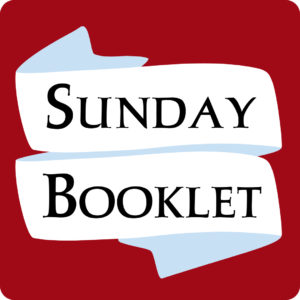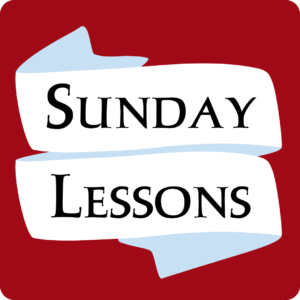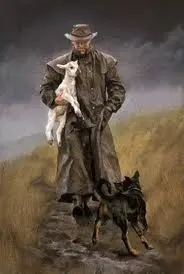Worship Guide for May 11, 2025
Like TV Guide, but from God! Find the text of the Prayers of the People and Sermon below. Use the buttons provided to find other worship materials.
To see the Worship Guide for other weeks, click here.
To see the Book of Common Prayer online, click here.
Prayers
Weekly Prayer List Recording:
Prayers of the People:
Easter 4, 11 May 2025
The response to the bidding, “Lord of new possibility,” is “hear us”
Lord in time and space –In the time in between the resurrection of Jesus as the Christ and the general restoration of the entire creation we wait with patience for the hope that is within us to become a force for good in a world increasingly deaf to the values and expectations of your kingdom. Lord of new possibilities, hear us.
We pray for the Church and her life: for Sean, the Presiding Bishop, and Nicholas, our bishop; for Hosam, the Archbishop of Jerusalem; for Leo VI, the newly elected Pope; for Bartholomew, the Ecumenical Patriarch, and other Christian leaders. Lord of new possibility, hear us.
We pray for the world and its pressing needs: Lamenting changed direction in American foreign policy, we continue to pray for the coming of peace with justice in the Middle East, remembering especially Palestinian communities now subject to militarized policy of ethnic cleansing.
We continue to pray for a negotiated peace in Ukraine that honors a commitment to Ukrainian sovereignty and future self-determination.
For the people of Sudan, Yemen, and Myanmar, for all forced to flee from their homes and homelands by poverty, violence, and war.
We remember communities worldwide adversely affected by the Administration’s cancellation of vital health and social development aid funding. Lord of new possibility, hear us.
We pray for the nation, mindful of so many concerns at this time:
The congregation is invited to bring your concerns for our country to the Lord, either silently or aloud—
Lord, we ask you to bless the Congress and the courts in upholding the integrity of the Constitution. Lord of new possibility, hear us.
We remember the earth, our increasingly fragile island home. We pray for a strengthening of emergency services and necessary infrastructure to meet the challenge of climate instability. Lord of new possibility, hear us.
We pray for all in need and in any trouble: for those whose strength is failing through ill health; whose spirits are flagging through depression; whose determination is being sapped through addiction; that they might know our comforting presence, and your healing. Lord of new possibility, hear us.
We remember with love those who have asked for our solidarity in prayer: Mary, Sam, Benjamin, Jerry, Aurise and the Gray-Warren Family, and others we name: [pause]. Lord of new possibility, hear us.
We pray for our own needs, together with those nearest and dearest to us, remembering especially those celebrating birthdays this week: Larry Bradner, Allicia Lacey, Alicia Taylor, Waylan Tucker, and Jason Anderson.
Lord of new possibility, hear us.
Rejoicing in the fellowship of so great a cloud of witnesses, we remember those who have recently died, and others we love but see no longer, especially those we name [pause]. We remember everyone coming to terms with the loss of a loved one.
Lord of new possibility, hear us.
Celebrant adds a concluding prayer.
Sermon
Of Shepherds and other Things
The Reverend Mark Sutherland
Fourth Sunday of Easter
Year C
Sermon Recording:
In John 10, we encounter Jesus’ riff on an extended metaphor of sheep and shepherds. I am the Good Shepherd. My sheep hear my voice. I know them, and they follow me. I give them eternal life – that is, life no longer subject to the restriction of temporal time.
Here are two seemingly contrasting shepherding images.
My nephew, Hamish, is a sheep farmer in the South Canterbury high country in the foothills of the Southern Alps – the mountain backbone of New Zealand’s South Island. This is Lord of the Rings country. Not the idyllic landscapes of the Shire but the astonishingly majestic terrain framed by the dark mountains of Mordor. Across 60,000 acres of tussock grassland, amid rocky crags and sharp ravines, Hamish runs around 12000 Marino sheep bred for the fineness of their wool, much prized by Italy’s fashion houses.
One day, during a visit some years ago, with Murray, Hamish’s father, we suddenly stopped as Murray leapt out of the cab of the truck and bounded down a steep-sided gully to where a ewe had been caught by its dense wool in a thorn tree, known locally as a Lawyer Bush because the saying goes, once caught you’ll never get free. Cutting the ewe free, he hoisted it in one smooth movement onto his shoulders, and with the ewe draped around his neck, he climbed back up, depositing it on the truck bed before we drove off.
B.W. Johnson in The People’s New Testament, his 1891 bible commentary, recalls the following.
As we ate and looked, almost spellbound, the silent hillsides around us were in a moment filled with sounds and life. The shepherds led their flocks forth from the gates of the city. They were in full view and we watched and listened to them with no little interest. Thousands of sheep and goats were there in dense, confused masses. The shepherds stood together until all came out. Then they separated, each shepherd taking a different path, and uttering, as he advanced, a shrill, peculiar call. The sheep heard them. At first the masses swayed and moved as if shaken with some internal convulsion; then points struck out in the direction taken by the shepherds; these became longer and longer, until the confused masses were resolved into long, living streams, flowing after their leaders. Such a sight was not new to me, still it had lost none of its interest. It was, perhaps, one of the most vivid illustrations which human eyes could witness of that beautiful discourse of our Savior recorded by John.
Johnson’s almost biblical depiction of shepherds leading their sheep over rocky hillsides is not an image that translates well to modern NZ shepherding. The NZ sheep farmer is more herder than shepherd as he stands to the side, he commands his sheepdogs with piercingly high whistles produced by use of a flat plastic device held between the teeth. With much barking and nipping of sheep heels the dogs gather and drive the herd on.
Unlike Johnson’s scene, which is so strongly reminiscent of Jesus’ Good Shepherd imagery, there is little sense of this kind of intimacy between Kiwi shepherd and sheep. Yet, in the moment when Murray bounded off to retrieve his solitary ewe, the power of the biblical image of the Good Shepherd who leaves the 99 to go in search of the one lost sheep communicated an unexpected intimacy.
I am the Good Shepherd. My sheep hear my voice. I know them, and they follow me. I give them eternal life – that is, timeless life as in life unrestricted by the limitations of temporal time.
In 2025, the good shepherd imagery of Jesus in John’s Gospel occurs on the second Sunday in May, otherwise known as Mother’s Day. Whether by design or not, it’s an interesting coincidence that emboldens me to reframe Jesus’ good shepherd metaphor as: I am the good mother. My children hear my voice. I know them, and they trust me. I give them eternal life—a life of relationship with me that cannot be measured or restricted by the limitations imposed by temporal time.
We hear Jesus’ voice -to quote from TS Eliot in Little Gidding:
a voice … not known, because not looked for -but heard, half-heard, in the stillness between two waves of the sea.
The voice of the good mother is the voice heard, and yet not heard, remembered, and yet not looked for, but viscerally felt; a voice we trust because it resonates through the finely tuned strings of our memory.
This half-remembered yet forgotten voice enters our lives through the earliest experience at our mother’s breast—if not while we are still in utero. Nurture echoes nature. The human bond of mother and child echoes the bond between God and humanity. Jesus says, I am the good mother. My children hear my voice, I know them, and they trust me.
In John’s Christology, there is no distinction between Jesus the Logos and God the Creator; in each, the other finds its reflection. God, the good shepherd, enters our human experience at first as God the good mother. We learn to trust God, the good mother, who calls us each by name and protects us from danger, because like a mother, God has first loved us with a quality of unconditionality that is breathtaking to contemplate.
Imagine being loved because you are already good enough. The problem for many of us is it requires courage and faith to see ourselves as God, the good mother, sees us.
Jesus’ voice is heard and yet half heard, remembered, and yet not looked for, but viscerally felt; a voice we trust because it resonates through the finely tuned strings of early memory. Jesus, the good shepherd, enters our lives through our experience of the divine good mother.
Donald Winnicott, the renowned 20th-century British pediatrician and psychoanalyst, coined the phrase “good-enough mother.” Winnicott’s, legacy has been a formative influence on my evolution as a psychotherapist and priest.
By good enough, Winnicott meant that mothers did not need to be perfect. The mother-infant relationship, though vulnerable to mishap, is also robust and able to withstand imperfect conditions. The reminder that mothers need to be good enough and not perfect is a reminder that the quest for the perfect in this arena of life is certainly the enemy of the good. The essence of a good-enough experience of mothering lies in our experience of love that is simply consistent and unconditional.
Many feel as a lifelong absence the early lack of the unconditional love of the good-enough mother. Maternal failure is often due to a perfect storm of emotional and environmental failures that interrupt or prevent the formation of a good-enough mother-infant bond. Yet, if we didn’t find the memory of good-enoughness in our early experience with our mothers, maybe we found it through good-enoughness in the love of a grandmother or grandfather, in the compensating love of an aunt or uncle, or even later, a devoted teacher or mentor. Good-enough mothering, though more usually exercised by women, is nevertheless a universal human quality found in the rich variety of human relationships.
Yet an early experience of a disinterested or unavailable mother will leave its mark. An early experience of the promise of love being restricted by conditions – I will love you only if — is not an uncommon experience. Yet, there are very few people who cannot locate an experience of unconditional love somewhere in their early formation.
Jesus says I am the good-enough mother. I have no choice; for I cannot -not – love my children and give them eternal life, that is, life that cannot be restricted by the limitation of temporal time.
Our lives are bounded between the bookends of Jesus’s resurrection as the first fruits of the hope for new life and the promise of the resurrection of the entire creation at the end of time. Jesus said, “I am the Good Shepherd. My sheep hear my voice. I know them, and they follow me. I give them eternal life. Eternal life is realizing the promise of good-enough love extended to all.”
America stands out among developed Western nations as a society that continually fails those entrusted with the sacred responsibility for mothering. In a country that eulogizes motherhood and apple pie, the US ranks very low on the scale of nations where public policy concretely supports family life and child development. A society configured by the divine mothering template will ensure maternal and paternal paid leave, supported childcare, public pre-school and kindergarten education free at the point of use. The paradox at the heart of American society concerns the disproportion between our passion for the unborn and our social neglect of the born.
Human mothering only needs to be good enough, not perfect. For some of us, Mother’s Day will be an opportunity to reaffirm the heart-felt forgiveness that soothes the discordant strings of early memory. For most of us, Mother’s Day will be an opportunity to express feelings of gratitude for the love our mothers gave us. Whichever may be the case, for each one of us, the divine good mother encourages us to be good-enough mothers to those who trust us to love and care for them.
I am the good shepherd. My sheep hear my voice – a voice … not known, because not looked for -but heard, half-heard, in the stillness between two waves of the sea; – a voice not heard but remembered; a voice not looked for but viscerally felt; a voice we trust because it resonates through the finely tuned strings of our memory.
My sheep know my voice, they follow me, and I give them eternal life – a life that is not restricted by the limitations imposed by temporal time.





